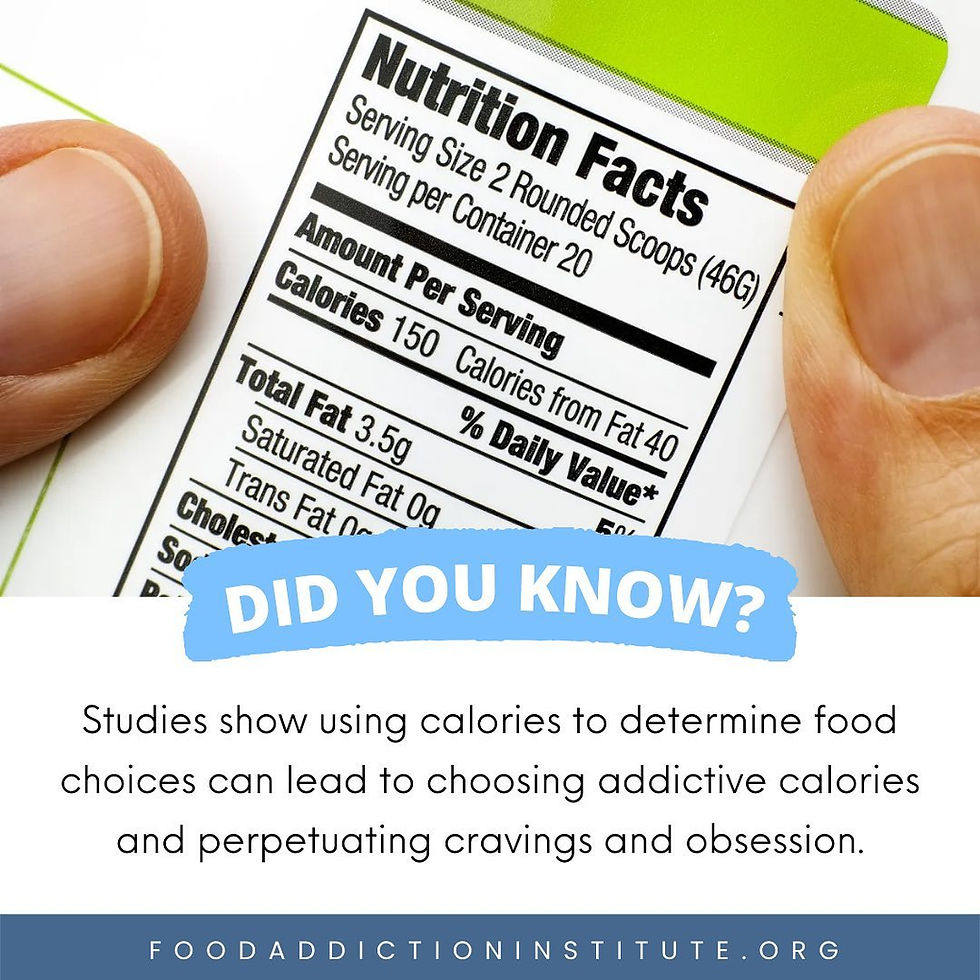Processed Foods: The American Addiction
- Jul 15, 2023
- 3 min read
Updated: Apr 25, 2024

If you are like most Americans, you probably consume a lot of processed foods every day.
What are processed foods?
Processed foods are foods that have been altered from their natural state, usually by adding
sugar,
salt,
fat,
preservatives,
artificial flavors,
colors, or
other additives.
Processed foods are designed to be convenient, cheap, and tasty, but they also have a dark side: they can be addictive and harmful to your health.
According to a recent study by researchers at the University of Michigan, processed foods are the most addictive foods in the American diet.
The study surveyed more than 500 people and asked them to rate how addictive they found 35 different foods, ranging from whole foods like carrots and apples to highly processed foods like pizza and chocolate.
The results showed that the most addictive foods were those that were high in fat, sugar, and refined carbohydrates, such as cookies, chips, ice cream, french fries, and cheeseburgers.
These foods activate the same reward pathways in the brain as drugs like cocaine and heroin, making us crave more and more of them.
Processed foods not only trigger addiction, but also contribute to a host of health problems, such as
obesity,
diabetes,
heart disease,
cancer, and
depression.
Processed foods are
high in calories,
low in nutrients, and
often contain harmful chemicals that disrupt our hormones, metabolism, and immune system.
Processed foods also alter our gut microbiome, the community of bacteria that live in our digestive tract and influence our mood, behavior, and overall health.
A diet rich in processed foods can cause dysbiosis, an imbalance of good and bad bacteria in the gut, which can lead to inflammation, leaky gut syndrome, and increased risk of autoimmune diseases.
So how can we break free from our addiction to processed foods?
The first step is to become aware of what we are eating and how it affects us.
We can start by reading food labels and avoiding foods that contain added sugars, trans fats, artificial ingredients, or other red flags.
We can also try to eat more whole foods that are close to their natural state, such as fruits, vegetables, lean meats, eggs, and dairy. These foods are rich in fiber, protein, healthy fats, vitamins, minerals, antioxidants, and probiotics that nourish our body and mind.
A way to overcome our addiction to processed foods is to find healthier alternatives that satisfy our cravings without harming our health. Instead of drinking soda or juice when we are thirsty, we can drink water or tea with some lemon or mint, or other zero calorie, non-sweetened liquids on a regular basis all day so we are never dehydrated. We can begin by stopping snacks between meals, and planning the timing of our meals, and the amount of food we prepare to eat for each meal.
Identifying what foods trigger our cravings and addiction cycle responses, eliminating all forms of ultra processed foods in addition to sugar, grains, and other substances, are how those with long term recovery from food addiction maintain their ability to live a healthy life free from the effects of processed foods on their bodies. It starts with recognition of ingredients in the foods that we ingest, awareness of what foods trigger our unhealthy eating, observing how and when we are eating that is not aligned with our goals for self-care, finding communities of people who put their health ahead of what Big Food and societal pressure would have them eat, to make a big difference in our health and well-being.
Processed foods are the American addiction that must be addressed and overcome if we want to live longer and happier lives. By becoming more mindful of what we eat, choosing more wholesome foods that nourish our body and mind, eating in a structured, planned way with support from a community of others who have recognized the dire effects of processed foods on their own health, we can break free from the vicious cycle of craving and consumption that keeps us hooked on processed foods.
This blog post was inspired by the Guardian article: Flamin’ hot addictions: why is America so hooked on ultra-processed foods?
Here is the original article that inspired this post:
Become a supporting member of the Food Addiction Institute to gain access to and download the research source material cited in the article, as well as the FAI research archives, community and professional network.
Monteiro, C. (2009). Nutrition and health. The issue is not food, nor nutrients, so much as processing. Public Health Nutrition, 12(5), 729-731. doi:10.1017/S1368980009005291
article about controlled study
Spence, C. Eating with our ears: assessing the importance of the sounds of consumption on our perception and enjoyment of multisensory flavour experiences. Flavour4, 3 (2015). https://doi.org/10.1186/2044-7248-4-3




Comments